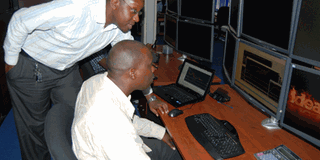Online forex trading taking shape in Uganda

A tutor teaches a student how online forex trading is done at Reilag Investments Limited. Photo by Isaac Kasamani
What you need to know:
It is here and it has taken forex trading to another level. However, despite the vast amounts of money involved, no government institution is in charge of regulating the trade. This is because there is no legal framework governing it as Walter Wafula writes.
A growing number of daring Ugandans is engaging in an extremely risky but lucrative internet-based business. Globally, it’s known as online forex (FX) trading but it is seen as gambling in Uganda.
Forex trading is the buying and selling of different currencies by either firms or individuals. The most traded currencies are United States dollar, the Euro, British Pound and Japanese Yen. One currency is usually traded for another. The business is conducted by internet and foreign exchange (Forex) savvy traders across the world with a network of agents across the globe.
For one to trade, he or she needs a forex account from the participating brokerage firms or agents. But to make profits in the money markets, just like in the stock markets, one has to be quite knowledgeable and up to date with information across the globe. It’s not that kind of business that every Tom, Dick and Harry can do. You must have the right information and must do it at the right time in order to make money.
Business Power has observed and spoken to market players over the past few months and discovered that the trade is now worth billions of shillings in Uganda.
Despite the vast amounts of money involved, no government institution is in charge of regulating the trade. This is because there is no legal framework governing it.
The business is, however, recognised as any other and has attracted at least 250 daring Ugandans. The individuals commit between $1,500 (Shs3.5 million) and $2,500 (Shs5.8 million) to local traders and international brokerage firms in the United States, Europe and Asia.
In return, the investors are getting between $300 (Shs705,000 and $510 (about Shs1,2 million) per month for a period of 24 months, according to traders and beneficiaries that Business Power interviewed.
An official working for one of the leading television house in Uganda said he and his wife invested $2,500 with one of the forex firms in Kampala about a year ago. Today the couple is getting a monthly interest of $500 as were promised.
“From the time we started getting our money, we have not missed any payments.
Our money comes on the dot and we don’t even call the guy. We find it on our dollar account,” he said in an interview last Friday.
Mr John Kasumba, the managing director of Reilag Investments Limited in Naguru, a Kampala suburb, told Business Power that he has built a $10 million (Shs23,5 billion) business out of online forex trading. But that value takes into account his customer deposits, accumulated interest and other investments the business holds.
Reilag was started as an unregistered business with less than $10,000 in 2009 but has been established on the foundation of online forex trading. The company has been built on the proprietor’s trust among friends and relatives. They have entrusted him with at least Shs1.3 billion in return for interest from trading their dollars.
“The biggest risk is trusting us,” he says of the company that is owned by him and Ms Sheila Kagundu. It’s at their company that a client who wishes to participate in the international money markets deposits $2,500, in return for $510. The company has a partnership with Cyprus-based FxPro Group, a rapidly expanding forex brokerage company in the world.
The greatest risk is; all the money he has handled has been banked on his forex account and not his clients’ account. He agrees that if anything fatal happened to him today, billions of his clients’ money could be lost.
“But I have built my business on reputation and that is our biggest asset,” he says.
Today, Mr Kasumba says the company is trading for companies and individuals including some of the city’s top corporate managing directors in Kampala.
“I cannot reveal my clients’ identities for confidentiality reasons,” he said.
Besides making money by trading for others, online forex traders are making money by training others how to make money in the business. The training comes at a fee of $200 (Shs460, 000) for a maximum of 14 days.
Students are given tips on how to operate the trading platforms that international brokerage firms provide and also when to buy and sell currencies.
A trainer who spoke to Business Power but also preferred anonymity said he is currently training 10 people how to trade currencies in global markets. He also has six customers he is helping trade their money.
Unlike Reilag Investments, the Mukono town-based trader helps his customers to open forex accounts with international brokerage firms like FxPro, Windsor Brokers Limited (Cyprus), Alpari (USA), Questrade Inc (Canada) and Delta Stock in Bulgaria. These firms and others require a minimum deposit of between $50 and $50,000 to join their client base.
However, the forex trader requires a minimum of $1,500 to help an investor trade. In return, he commits to help the customer earn at least 20 per cent ($300) of his or her deposit per month.
But in return, the client must commit to pay him 30 per cent ($90 or Shs211, 000) of the proceeds as his commission. Both deals are signed before attorneys to increase trust.
Forex traders generate income (interest) by buying particular currencies when they depreciate and selling them when they appreciate against other currencies.
The difference between the buying and selling price is called a spread. The spreads range from between 0.1 to 15 cents on a daily basis. The higher the spread the more money the trader or broker and his client earn.
Business Power has noted that this kind of business is going on but secretly because it’s not well regulated although companies like Reilag are willing to be regulated by the Bank of Uganda, and the Capital Markets Authority (CMA).
But Mr Joseph Lutwama, a senior legal officer at the CMA, last year told journalists that the business is illegal in Uganda and there are some individuals who are building pyramid schemes out of the trade.
Mr Stephen Kaboyo, the director of financial markets at Bank of Uganda equally disregarded the business despite being in charge of currency markets in the country.
“It is not regulated business. It’s really outside our regulatory provision as far as the forex market is concerned,” he said in an interview on Friday. “It’s just like any other business. If you are interested, you go in. If you go there and lose your money, you don’t complain.”
Market players like Mr Kasumba who are making big bucks from the trade and building business empires are beginning to restructure their operations to improve governance. The restructuring is also aimed at making customer deposits safer.
Reilag has been operating two accounts namely; the Guaranteed Account and Personally Managed Account. The business has largely been built on the guaranteed account which will be phased out by 2013.
“This is the way we started and thought we would do business that way. But as we grew, we found better ways of doing business,” he said.
The better way is letting clients open their global FX accounts and be in control of their deposits. But the trading will be carried out by the Reilag, which will then expect a commission from the client. But to achieve that, strict rules of engagement will have to be laid as his clients may not be as trustworthy as he has been.
Besides, introducing the new account, the company is also moving to lock out more individuals from joining its client base by increasing the required minimum deposit from $2,500 to $10,000 (Shs23.5 million). By controlling the number of clients, the firm wants to have a number of exclusive clients it can diligently serve without getting itself in a mess.
Mr Kasumba is also hoping that the government can come up with a law to govern the growing trade as soon as possible.
“I would love that regulation to be done in due time and well,” he said.
To deal with the risk of collapse and loss of customer deposits, he said the firm is now seeking the services of an insurance firm to underwriter the funds Reilag holds.
While Reilag Investments appears to be working towards becoming a reputable legal entity, there are many brief case companies that are attempting or planning to get involved in the same business. The government should therefore come up with regulations that can govern how the business is conducted to prevent any loss of hard-earned money by individuals and businesses in Uganda.




